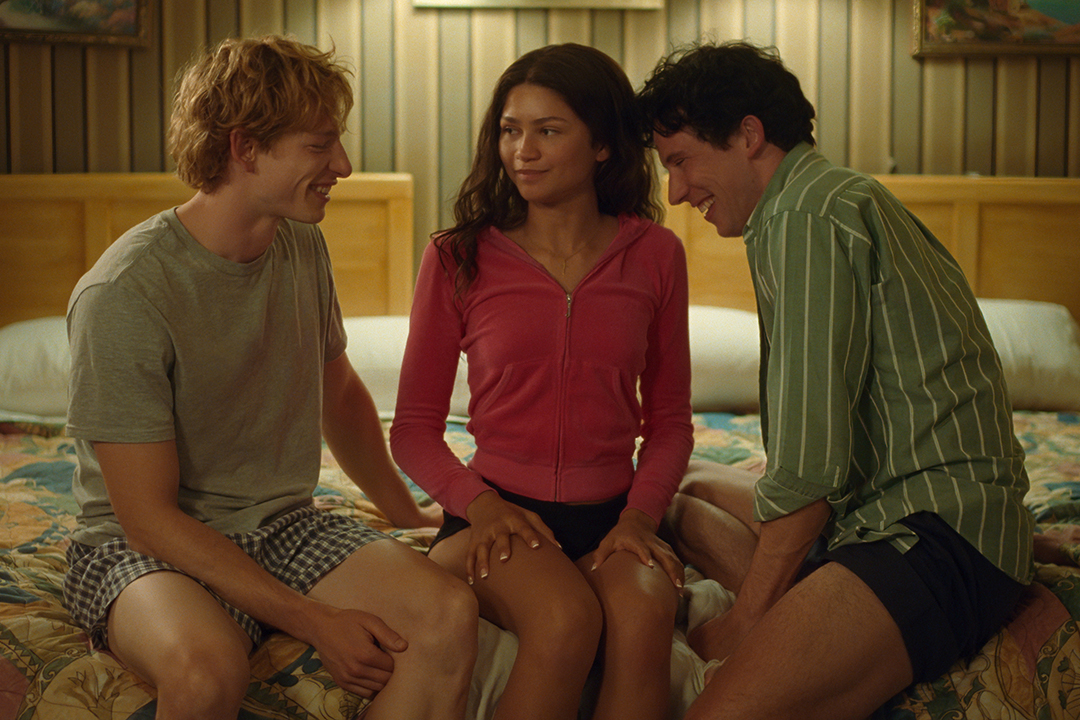Before Leo the Lion, Metro-Goldwyn-Mayer’s iconic furry mascot, even unleashes his signature primal roar, “Challengers” establishes itself as a sweat-drenched, sexually-charged thrill ride.
At the onset of this brief, slow-motion scene — framed exclusively in close-ups — Art Donaldson (Mike Faist), a professional tennis player in hot pursuit of a Grand Slam, leaps into the air, his racket rising with him. Across the net, Patrick Zweig (Josh O’Connor), a relatively unknown player, tilts his head upwards, awestruck, before extending his arms toward his opponent. In the bleachers, Tashi Duncan (Zendaya), Art’s wife and coach, scrutinizes the events unfolding before her with great fervor.
All three radiate pure ecstasy.
As the film demonstrates throughout the remainder of its 131-minute runtime, this trio endured a series of betrayals, setbacks and trysts to arrive at this defining moment in 2019: the final match of the Phil’s Tire Town Challenger, a low-level tournament held in New Rochelle, New York.
Screenwriter Justin Kuritzkes structures the 13-year run-up to this enthralling, court-bound conflict non-linearly. He gradually feeds the audience revelations about the leads’ tumultuous past that provide dramatic weight to the backhands, serves and digs that comprise this adrenaline-laden confrontation.
Bringing each scene to life is an awards-worthy, three-person ensemble of Zendaya — who also serves as one of the film’s producers — O’Connor and Faist.
Zendaya, a two-time Emmy winner for her portrayal of a teenager struggling with addiction in HBO’s “Euphoria,” is superb in the tense scenes she shares with O’Connor, himself an Emmy laureate for his turn as Charles, Prince of Wales, in the Netflix drama “The Crown.”
Take the scene in which Patrick, on the eve of his match against Art in the film’s present, suggests that Tashi coach him, arguing that her spouse is ready to retire. Zendaya’s once-blank expression suddenly dissipates at the request, replaced with a blend of disbelief and anger, effectively conveying Tashi’s disdain for the idea.
O’Connor is similarly excellent, deftly bringing Patrick, an arrogant, determined and lustful individual, to life onscreen. Arguably his best moment comes toward the film’s end, in a scene in which he and Art exchange barbs in a sauna the night before the challenger’s deciding match.
Patrick casually strolls into the steam-filled enclosure nude, stopping next to Art before positioning himself in a manner that leaves his genitalia fully exposed, much to his future opponent’s chagrin. O’Connor truly sells his character’s debauchery here, appearing laid-back and smug in his body language, tone of voice and relaxed facial movements.
Faist, a BAFTA nominee for his work in Steven Spielberg’s reimagining of “West Side Story,” may have a less bombastic role than Zendaya or O’Connor, but he manages to stand out nonetheless by convincingly capturing Art at various stages in his life.
All three change considerably by the film’s end, but Art’s transformation is undoubtedly the greatest; he goes from a bright-eyed, talkative teen to a timid, soft-spoken adult. Faist realizes these extremes expertly, oozing charisma and zeal in flashbacks while emanating uncertainty and exhaustion in the present.
Darnell Appling, Zendaya’s assistant, also stuns as the challenger’s umpire, turning what could’ve been a vacuous role into something sensational — largely thanks to his effortlessly cool demeanor.
Further elevating the film is, unsurprisingly for those familiar with his work, Luca Guadagnino’s direction, especially during the third act. Guadagnino delivers his most visually inventive film yet by, for instance, placing viewers into a tennis ball’s perspective, bouncing and rotating around the court, during the heated final match.
Moreover, Guadagnino certainly knows how to render the human form erotically. Faist and O’Connor’s muscled thighs, frequently framed in close-ups throughout the match, glisten in the sunlight. Similarly, his camera closely scans Zendaya’s delicate figure as she dances during a scene set at an Adidas-sponsored event.
These moments, energetic and sexy, are backed by an infectious, pulsating score courtesy of Trent Reznor and Atticus Ross, who previously composed music for Guadagnino’s cannibal love story “Bones and All.” When employed, the catchy, up-tempo tracks invigorate an already kinetic moviegoing experience.
Suffice it to say, viewers are likely to end the film as Tashi did — ecstatic and screaming for more.











